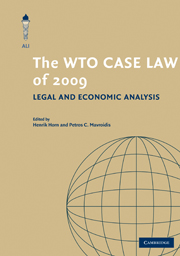Book contents
- Frontmatter
- Contents
- Foreword
- Introduction
- US Compliance with WTO Rulings on Zeroing in Anti-Dumping
- United States – Continued Existence and Application of Zeroing Methodology: the end of Zeroing?
- Incomplete Harmonization Contracts in International Economic Law: Report of the Panel, China – Measures Affecting the Protection and Enforcement of Intellectual Property Rights, WT/DS362/R, adopted 20 March 2009
- Comment
- Trading Cultures: Appellate Body Report on China–Audiovisuals
- Comment
- ‘Optimal’ Retaliation in the WTO – a commentary on the Upland Cotton Arbitration
US Compliance with WTO Rulings on Zeroing in Anti-Dumping
United States–Zeroing (EC); United States–Zeroing (Japan)
Published online by Cambridge University Press: 05 December 2011
- Frontmatter
- Contents
- Foreword
- Introduction
- US Compliance with WTO Rulings on Zeroing in Anti-Dumping
- United States – Continued Existence and Application of Zeroing Methodology: the end of Zeroing?
- Incomplete Harmonization Contracts in International Economic Law: Report of the Panel, China – Measures Affecting the Protection and Enforcement of Intellectual Property Rights, WT/DS362/R, adopted 20 March 2009
- Comment
- Trading Cultures: Appellate Body Report on China–Audiovisuals
- Comment
- ‘Optimal’ Retaliation in the WTO – a commentary on the Upland Cotton Arbitration
Summary
Abstract: This paper reviews the WTO Appellate Body Reports on United States–Zeroing (EC) (Article 21.5 DSU – EC) (WT/DS294/AB/RW, 14 May 2009) and United States–Zeroing (Japan) (Article 21.5 DSU – Japan) (WT/DS322/AB/RW, 18 August 2009). The Appellate Body found that the United States had not brought its anti-dumping measures into compliance with the WTO Anti-Dumping Agreement as it continued to use zeroing in annual reviews of anti-dumping orders. We argue that this conclusion – based on a complicated discussion of what constitutes a ‘measure taken to comply’ – could have been reached through a much simpler and direct argument. Continued noncompliance by the United States generates costs to traders targeting the United States and the trading system more generally. We argue that from a broader WTO compliance perspective consideration should be given to stronger multilateral surveillance of anti-dumping practice by all WTO members and to more analysis and effective communication by economists regarding the costs of zeroing and anti-dumping practices more generally.
Introduction
This paper reviews the WTO Appellate Body (AB) Reports on United States–Zeroing (EC) (Article 21.5 DSU – EC) (WT/DS294/AB/RW, 14 May 2009) and United States–Zeroing (Japan) (Article 21.5 DSU – Japan) (WT/DS322/AB/RW, 18 August 2009). These disputes concerned the manner in which the United States implemented – or failed to implement – the WTO rulings relating to the prohibition of zeroing in anti-dumping investigations and reviews. The main legal issue dealt with in these compliance cases was what prospective implementation means in the context of a retrospective system of administering anti-dumping measures.
- Type
- Chapter
- Information
- The WTO Case Law of 2009Legal and Economic Analysis, pp. 5 - 44Publisher: Cambridge University PressPrint publication year: 2011

